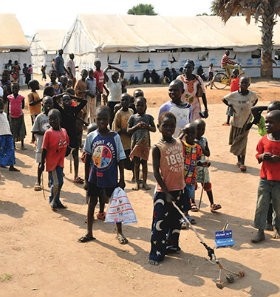Refuge in Uganda: A poor nation opens its doors

Last summer, while the attention of the world was focused on the World Cup in Brazil—the two weeks of the year when even Americans get excited about soccer—another competition was being organized in northern Uganda. According to a news release from the relief organization World Vision, Sudanese men living in refugee settlements organized a series of friendly “football for peace” matches. Each team included men from different ethnic groups—groups whose differences have sparked deadly clashes in their home countries.
Even though there were fewer soccer balls than teams, and even fewer uniforms to help players recognize their teammates, these matches helped overcome some divisions, World Vision reported. Watching their sons competing for goals motivated the elders to work more closely together across ethnic lines.
The East African nation of Uganda is not wealthy by any measure. United Nations figures for 2011 show per capita income of less than $2 per day. Life expectancy at birth is about 54 years; infant mortality rates stand at 72 per thousand live births. Per capita income in the United States is nearly 100 times higher; life expectancy is 35 years longer; and infant mortality is less than one-tenth as high. With so little in its own pantry, one would hardly expect Uganda to be a major contributor to its neighbors’ welfare.




